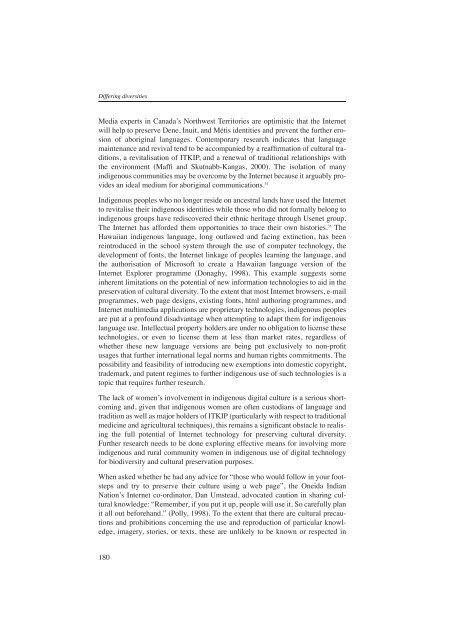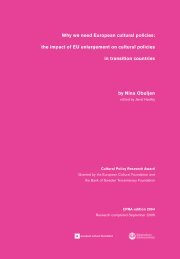Tony Bennett, Differing diversities - Council of Europe
Tony Bennett, Differing diversities - Council of Europe
Tony Bennett, Differing diversities - Council of Europe
Create successful ePaper yourself
Turn your PDF publications into a flip-book with our unique Google optimized e-Paper software.
<strong>Differing</strong> <strong>diversities</strong>Media experts in Canada’s Northwest Territories are optimistic that the Internetwill help to preserve Dene, Inuit, and Métis identities and prevent the further erosion<strong>of</strong> aboriginal languages. Contemporary research indicates that languagemaintenance and revival tend to be accompanied by a reaffirmation <strong>of</strong> cultural traditions,a revitalisation <strong>of</strong> ITKIP, and a renewal <strong>of</strong> traditional relationships withthe environment (Maffi and Skutnabb-Kangas, 2000). The isolation <strong>of</strong> manyindigenous communities may be overcome by the Internet because it arguably providesan ideal medium for aboriginal communications. 34Indigenous peoples who no longer reside on ancestral lands have used the Internetto revitalise their indigenous identities while those who did not formally belong toindigenous groups have rediscovered their ethnic heritage through Usenet group.The Internet has afforded them opportunities to trace their own histories. 35 TheHawaiian indigenous language, long outlawed and facing extinction, has beenreintroduced in the school system through the use <strong>of</strong> computer technology, thedevelopment <strong>of</strong> fonts, the Internet linkage <strong>of</strong> peoples learning the language, andthe authorisation <strong>of</strong> Micros<strong>of</strong>t to create a Hawaiian language version <strong>of</strong> theInternet Explorer programme (Donaghy, 1998). This example suggests someinherent limitations on the potential <strong>of</strong> new information technologies to aid in thepreservation <strong>of</strong> cultural diversity. To the extent that most Internet browsers, e-mailprogrammes, web page designs, existing fonts, html authoring programmes, andInternet multimedia applications are proprietary technologies, indigenous peoplesare put at a pr<strong>of</strong>ound disadvantage when attempting to adapt them for indigenouslanguage use. Intellectual property holders are under no obligation to license thesetechnologies, or even to license them at less than market rates, regardless <strong>of</strong>whether these new language versions are being put exclusively to non-pr<strong>of</strong>itusages that further international legal norms and human rights commitments. Thepossibility and feasibility <strong>of</strong> introducing new exemptions into domestic copyright,trademark, and patent regimes to further indigenous use <strong>of</strong> such technologies is atopic that requires further research.The lack <strong>of</strong> women’s involvement in indigenous digital culture is a serious shortcomingand, given that indigenous women are <strong>of</strong>ten custodians <strong>of</strong> language andtradition as well as major holders <strong>of</strong> ITKIP (particularly with respect to traditionalmedicine and agricultural techniques), this remains a significant obstacle to realisingthe full potential <strong>of</strong> Internet technology for preserving cultural diversity.Further research needs to be done exploring effective means for involving moreindigenous and rural community women in indigenous use <strong>of</strong> digital technologyfor biodiversity and cultural preservation purposes.When asked whether he had any advice for “those who would follow in your footstepsand try to preserve their culture using a web page”, the Oneida IndianNation’s Internet co-ordinator, Dan Umstead, advocated caution in sharing culturalknowledge: “Remember, if you put it up, people will use it. So carefully planit all out beforehand.” (Polly, 1998). To the extent that there are cultural precautionsand prohibitions concerning the use and reproduction <strong>of</strong> particular knowledge,imagery, stories, or texts, these are unlikely to be known or respected in180














